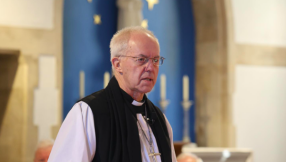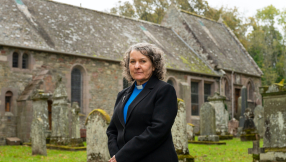The oldest solar eclipse ever recorded could help explain a biblical story that has baffled scholars for generations.
Cambridge University researchers say they have pinpointed the day of the first known eclipse to October 30, 1,207 BC – 3224 years ago today. Using a combination of biblical texts and ancient Egyptian archives, the scholars think the discovery could explain a passage in the book of Joshua.
The text in Joshua 10. 1-15 says the Israelites had been led into Canaan – modern day Israel-Palestine – after fleeing Egypt and during one particular battle Joshua prayed in verses 12-13: '"Sun, stand still over Gibeon, and you, moon, over the Valley of Aijalon." So the sun stood still, and the moon stopped, till the nation avenged itself on its enemies.'
Professor Sir Colin Humphreys from Cambridge's Department of Materials Science & Metallurgy said if these words describe a real observation it would be 'a major astronomical event' that was taking place.
'Modern English translations, which follow the King James translation of 1611, usually interpret this text to mean that the sun and moon stopped moving,' he said.
'But going back to the original Hebrew text, we determined that an alternative meaning could be that the sun and moon just stopped doing what they normally do: they stopped shining.
'In this context, the Hebrew words could be referring to a solar eclipse, when the moon passes between the earth and the sun, and the sun appears to stop shining.
'This interpretation is supported by the fact that the Hebrew word translated "stand still" has the same root as a Babylonian word used in ancient astronomical texts to describe eclipses.'
Although the suggestion of an eclipse has been made before, historians ruled out proving the theory because of the complex calculations involved. But Sir Colin along with his co-author Graeme Waddington devised an 'eclipse code'. From their theory, the only annular eclipse visible from Canaan between 1500 and 1050 BC was on 30 October 1207 BC, in the afternoon.
This matches historical evidence from the Merneptah Stele, a text from the reign of the Pharaoh Merneptah, also used in the study that shows that the Israelites were in Canaan between 1500 and 1050 BC.
The results are published in the Royal Astronomical Society journal Astronomy & Geophysics.













